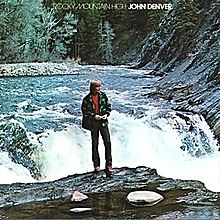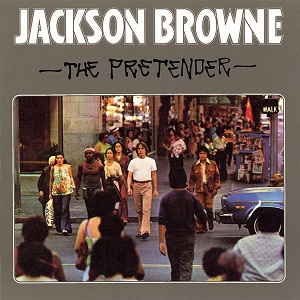
The Pretender is the fourth album by the American singer-songwriter Jackson Browne, released in 1976. It peaked at No. 5 on Billboard's album chart. The singles from the album were "Here Come Those Tears Again", which reached No. 23, and "The Pretender", which peaked at No. 58.

Catch Bull at Four is the sixth studio album by Cat Stevens. The title is taken from one of the Ten Bulls of Zen.

No Secrets is the third studio album by American singer-songwriter Carly Simon, released by Elektra Records on November 28, 1972.

Hotcakes is the fourth studio album by American singer-songwriter Carly Simon, released by Elektra Records, on January 11, 1974. Featuring the major hits "Haven't Got Time for the Pain" and "Mockingbird", the latter a duet with her then-husband James Taylor, Hotcakes became one of Simon's biggest selling albums. Her first concept album, the autobiographical songs portray Simon happily married and beginning a family.
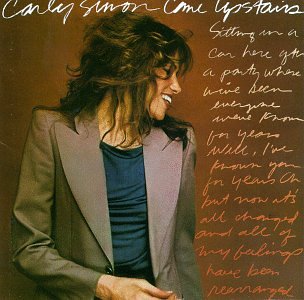
Come Upstairs is the ninth studio album by American singer-songwriter Carly Simon, released by Warner Bros. Records on June 16, 1980.

Sister Kate is singer Kate Taylor's first album, released in 1971.

Barry Manilow II is the second studio album by Barry Manilow released in 1974. Propelled by the major success of its lead single "Mandy" and featuring a further international hit in "It's a Miracle", the album was a commercial breakthrough for Manilow. First issued by Bell Records, it was reissued after the company was reorganized into Arista Records. The album's success spawned a notable parody in the picture sleeve of Ray Stevens' 1979 single, "I Need Your Help Barry Manilow".

Two Sides of the Moon is the only solo studio album by the English rock musician Keith Moon, drummer for the Who. It peaked at No. 155 on the Billboard 200. The album title was credited to Ringo Starr. Rather than using the album as a chance to showcase his drumming skill, Moon sang lead vocals on all tracks, and played drums only on three of the tracks, although he played percussion on "Don't Worry Baby". The album features contributions from Ringo Starr, Harry Nilsson, Joe Walsh of the Eagles, Jim Keltner, Bobby Keys, Klaus Voormann, John Sebastian, Flo & Eddie, Spencer Davis, Dick Dale, Suzi Quatro's sister Patti Quatro, Patti's bandmates from Fanny Jean Millington and Nickey Barclay, and future actor Miguel Ferrer.

Promised Land is the twenty-first studio album by American singer and musician Elvis Presley, released by RCA Records on January 8, 1975. It was recorded in December 1973 at Stax Records studios in Memphis and released on Presley's 40th birthday in January, 1975. In the US the album reached number 47 on the Billboard Top 200 chart and number 1 in Billboard's Top Country LPs chart, as well as the Cashbox Country albums chart. In the UK the album reached #21.

Good Times is the twentieth studio album by American singer and musician Elvis Presley, released on March 20, 1974. The album was constructed by the first pick of a session held at Stax Studios in Memphis in December 1973 and two songs, "I've Got a Thing About You Baby" and "Take Good Care of Her", which were left over from the session at Stax in July 1973. The album includes a collection of songs that vary in style and genre. Released the same day as the recording of Elvis: Recorded Live on Stage in Memphis was being made, the title was taken from the song "Talk About the Good Times". Many of the songs are covers of hits at the time, like "Spanish Eyes" and "She Wears My Ring". Charting low at the time of its release, it was considered typical 1970s Elvis material and was his first album to hit the "cut-out bins". The album did have some success though upon its original release, becoming a Cashbox Country Albums number 1 hit and charting in the Top 50 in the UK.

Leon Russell and the Shelter People is the second solo album by the singer-songwriter and multi-instrumentalist Leon Russell. Released in 1971, it peaked at number 17 on the Billboard Hot 200 in the United States. The album has gold certification for sales of over 500,000 albums in the US and Canada.

Windsong is the ninth studio album recorded by American singer-songwriter John Denver, which was released in September 1975. Denver's popularity was at its peak by this time.
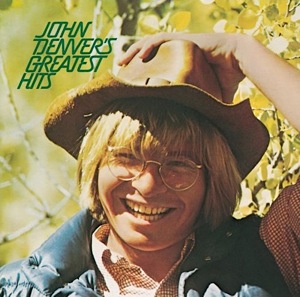
John Denver's Greatest Hits is the first greatest hits album by American singer-songwriter John Denver, released in November 1973 by RCA Records. A version known as The Best of John Denver with the same track listing was released in some countries.
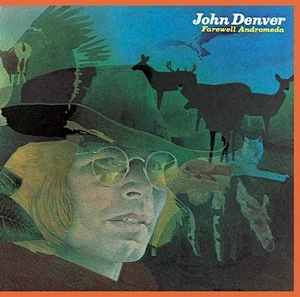
Farewell Andromeda is the seventh studio album by American singer-songwriter John Denver, released in June 1973. The LP made Billboard's Top 20, reaching No. 16, with three singles subsequently released: "I'd Rather Be a Cowboy" [#62 POP, #25 AC], "Farewell Andromeda" [#89 POP, No. 20 AC] and "Please, Daddy" [#69 POP, No. 69 C&W].

Back Home Again is the eighth studio album by American singer-songwriter John Denver, released in June 1974.

Rocky Mountain Christmas is the tenth studio album and first Christmas album by American singer-songwriter John Denver, released in October 1975 by RCA Records.

Spirit is the 11th studio album by John Denver. It was released in August, 1976. After the full-blown success of Windsong and its accompanying hit singles, this album began a downward chart trend for the singer, although he continued to have hits on the adult contemporary charts. "Baby, You Look Good to Me Tonight" reached #65 on the U.S. Billboard Hot 100, as well as reaching the Top 40 on the U.S. and Canadian Country and AC charts.
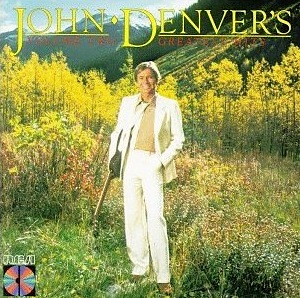
John Denver's Greatest Hits Volume 2 is a compilation album by American singer-songwriter John Denver, released in 1977. The single released from this album is "My Sweet Lady." It peaked at No. 13 on the adult contemporary chart, No. 32 on the pop chart, and No. 62 on the country chart in the United States.

Earth Songs is the 22nd studio album by American singer-songwriter John Denver released in June 1990.
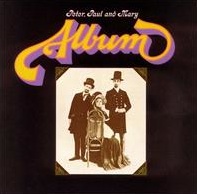
The Peter, Paul and Mary Album, also known as Album, is the sixth studio album by the American folk music trio Peter, Paul and Mary, released in 1966.
